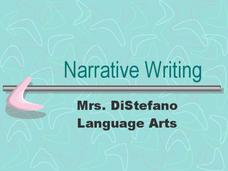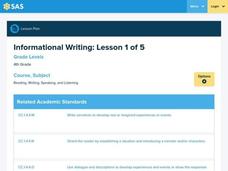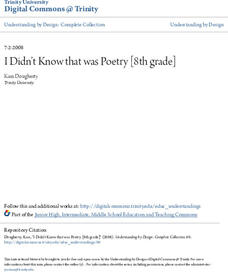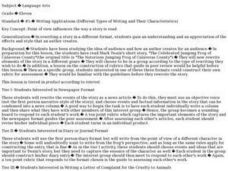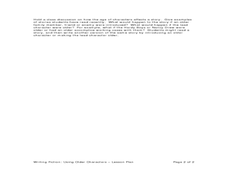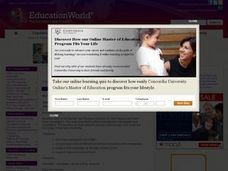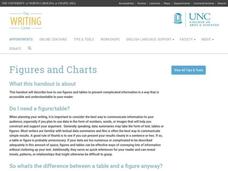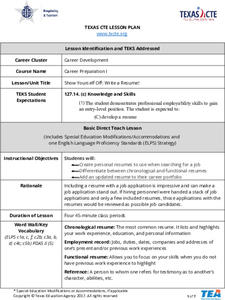Tech Coach Corner
Narrative Writing
A comprehensive presentation on narrative writing, this should be shown to a class before the writing process begins. There are not activities listed, so pupils can take notes on the elements of narrative writing and figurative language....
Curated OER
Writing an Informal Letter
What is the difference between formal and informal letter writing? Who gets a formal letter? What about an informal letter? This reference page presents different introductions and phrases you might see in each type of letter, and then...
Curated OER
Identifying Different Kinds of Sentences - The Peacock's Feathers
Identify sentence types within a short paragraph and complete a sentence transformation worksheet. Learners review sentence types and study a sentence identification chart. They watch a video about peacocks and identify sentence examples...
Pennsylvania Department of Education
Informational Writing
Emerging writers identify an informational piece of writing. They are provided with examples of informational writing and view a PowerPoint on narrative writing. Then, they design their own informational writing with a brochure,...
Trinity University
I Didn’t Know that was Poetry
Poetry or prose? That is the question facing middle schoolers as they begin a month-long poetry unit by examining the characteristics that differentiate poetry and prose writing. Pupils learn about poetic devices and different types of...
Curated OER
Writing Applications: Different Types of Writing and Their Characteristics
Twelfth graders rewrite a story in a different format to understand the effects of the author's style. In this writing style lesson, 12th graders read Mark Twain's "The Celebrated Jumping Frog of Calaveras County" and rewrite the...
Nancy Fetzer's Literacy Connections
Expository Paragraph
Upper elementary and middle school writers learn how to craft an expository paragraph by following the six steps detailed in a 48-page instructional guide. Learners learn how to write six different types of informational paragraphs: to...
Curated OER
Sentence Construction: What is a Sentence?
What must a sentence contain in order to be complete? What different types of sentences exist? Look at declarative, interrogative, and exclamatory sentences with this 17-slide presentation. Several example sentences are shown, and the...
Curated OER
Short Writing Paper
What an interesting resource to use as part of a writing activity! Learners discuss how to write an essay and tips to make it a rich experience. Included in the list of ways to improve writing are suggestions such as checking...
Curated OER
A Simple Task Made Complex: Types of Sentences
Looking for a lesson about differing sentence types? Use this lesson on compound and complex sentences in your grammar unit. After composing simple, compound, complex and compound-complex sentences individually and as part of a group,...
Curated OER
Brochure Writing
Have your budding authors evaluate various writing styles found in informational brochures. They look for effective writing, compare and contrast styles, and create an assessment.
Curated OER
Writing Fiction: Using Older Characters
Out with the old and in with the new? Not so in this lesson plan, which explores the idea of writing older characters in fiction. Students learn the value of varying their characters, exploring different perspectives, and avoiding...
Curated OER
Letter Writing: Social Action Project
Help your pupils sharpen their letter writing skills. They compose business letters that include greetings, headings, closings, and a professional tone for a philanthropic organization requesting information. Use this resource to...
Curated OER
Spring into Poetry
How many different types of poetry are there? Let me count them; list poems, haiku, and makes-me-think poems are only a few. Learners create their own poems accompanied by artistic projects such as haiku poems written on kites.
University of North Carolina
Art History
Art analysis might help uncover some of life's most puzzling questions, such as the mystery behind Mona Lisa's smile. The handout, from the Writing for Specific Fields series, is particularly useful for those interested in pursuing art...
Have Fun Teaching
March Journal Prompts
Engage your class in writing right away during the month of March. This resource provides writing prompts for every day in March, and each is decorated with a shamrock. For most of the prompts, learners use creative writing skills,...
University of North Carolina
Philosophy
Philosophers ask some of life's biggest questions about the nature of mankind, existence, and time, so what's it like to study the subject? A handout outlines different types of philosophy assignments common in college-level courses. The...
Curated OER
Writing Newsletters!
A reading of Gail Gibbons’ Deadline! leads to a discussion of the differences between newspapers and newsletters. Class members then choose a favorite topic and create the front page for their own newsletter.
University of North Carolina
Figures and Charts
Sometimes words aren't the best way to get information across to the reader. The eighth handout in the 24-part Writing the Paper series describes different type of figures and charts to display complex information in a paper....
University of North Carolina
Clichés
When it comes to writing, cliches are as old as dirt. A handout on tired phrases provides examples of cliches, as well as a description of the negative effects they have on a paper. Writers discover specific words and phrases to avoid,...
Houghton Mifflin Harcourt
Elaboration, Revision, and Proofreading
Designed to help writers strengthen their elaboration, revision, and proofreading skills, this 48-page workbook is packed with information about and exercises in personal, narrative, persuasive, and report writing.
Rainforest Alliance
Knowing the Essential Elements of a Habitat
To gain insight into the many different types of habitats, individuals must first get to know their own. Here, scholars explore their school environment, draw a map, compare and contrast their surroundings to larger ones. They then write...
University of North Carolina
Abstracts
Some of the best information to include when writing a research paper doesn't come from books, magazine articles, or informational websites—it comes from dissertations. However, reading an entire dissertation is often a daunting task....
Texas Education Agency (TEA)
Show Yourself Off - Write a Résumé!
Chronological or functional? Class members learn about the different types of resumes and then use a template to complete a draft resume. Next, they create, save, and print a professional resume.


